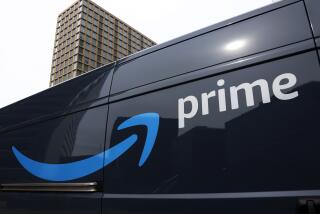Battle for Web Customers Pits Retailer Against Manufacturer
- Share via
There’s an increasingly powerful group of players selling goods on the World Wide Web: manufacturers. And their cyber-entry is causing all kinds of rifts in the time-honored relationships between retailers, suppliers and customers.
J.C. Penney customers checking Jcpenney.com for the Levi jeans they once bought in Penney stores instead find only Penney’s private-label brands. Levi Strauss & Co. has declared itself the only source of its products online and allows retailers to sell Levi merchandise in stores only.
On the other hand, online shoppers looking for a new Dustbuster won’t find it on Black & Decker Corp.’s Web site, at least for now. Retail giant Home Depot Inc., in a June letter to its suppliers, warned that if they sell online, they might find themselves out of Home Depot stores, a situation many suppliers cannot afford.
In this latest power struggle between those who make products and those who sell them, what the two groups are both claiming is customer loyalty.
Retailers, with elaborate customer data and expertise at displaying and pushing products, maintain that customers in the cyber world are most likely to trust the places they frequent in the real world.
Manufacturers willing to brave retailer wrath and sell on the Web are betting that their own ad campaigns and rebate programs will encourage customers to seek them out.
As the technology evolves, customers are likely to find new, unfamiliar hybrids of manufacturers and retailers that jointly operate Web sites, declaring a truce as each eyes an online shopping market that Forrester Research estimates will reach $1.4 trillion by 2003.
In the meantime, retailers and their suppliers are left in many cases to negotiate their terms as they go along.
“The No. 1 issue we’ve heard about in the past year, since everyone realized that Web retailing would matter, is, how is this going to change the balance of power between manufacturers and retailers?” said James McQuivey, a senior analyst with Forrester, which is based in Cambridge, Mass. “In the end, nothing is going to be the same.”
Of course, suppliers have long tried to encroach on retailers’ turf by opening their own flashy stores.
Shoemaker Nine West staked a claim in many areas right down the shopping mall corridor from the department stores and boutiques that have been loyal customers of its lines.
Airlines sell their tickets in competition with the travel agencies they hope will push their services.
But the Internet takes the tension between the two groups to global proportions. Instead of a few, isolated self-named stores, manufacturers can now set up a virtual shop accessible to every online consumer in the world and can avoid the expense of brick-and-mortar stores or offices.
As the two groups renegotiate their roles in furnishing products to customers, their old standard operating procedures are giving way to new methods for getting along.
* The Big Stick. Big retailers with a national reach have clout to dictate to suppliers. With 832 stores nationwide and plans to almost double that number by the end of 2002, Home Depot is one of them. Though it hasn’t yet started to sell on the Internet, the leader in home improvement does not want to compete with suppliers online.
Home Depot spokeswoman Carol Schumacher said the company has not defined what it would deem to be competition, but said it would like to work with its suppliers in developing its Internet strategy.
But some companies that were already taking orders on the Web, such as Newell Rubbermaid Inc., are continuing to do so. Others with information-only sites, such as tool and small-appliance maker Black & Decker, said they will take Home Depot’s thoughts into account as they develop their Internet plans.
* Brand Is King. Top brands with loyal customers view the Web as a way to build their images and deepen relationships with consumers--the main reasons Levi wanted to be the only online representative for its Levi’s and Dockers clothing, said spokesman Jeff Beckman. Though its market share is dropping, Levi has the clout to dictate to retailers and is doing so. Retailers are reluctantly going along. Penney’s sells Levi’s in its stores, but it agreed to drop the brand from its Web site.
* Share the Wealth. In relationships in which suppliers and retailers are closely linked, sharing is a logical step. Ethan Allen Interiors Inc. plans to share its online profits with its licensees, which own 60% of the more than 300 stores that bear the Connecticut-based furniture company’s name. When the company launches its new Web site this fall, orders placed with the manufacturer will be filled through the nearest retail store, which will receive 70% of the profits from the online sale for its trouble.
Similarly, equipment distributor W.W. Grainger Inc. awards commissions to area sales representatives when a customer purchases from Grainger.com.
In the majority of cases in which relationships are not well-defined, manufacturers and retailers are stepping lightly.
Toy maker Mattel Inc., which currently sells only specialized products online, is relaunching its Web site later this year to include its complete product line. The El Segundo-based company declined to elaborate but said its retail partners have been consulted throughout the development. Toys R Us said it looks forward to working with its longtime supplier.
Estee Lauder Cos. said it has different online shopping sites for three cosmetics lines and has taken care not to upset its retail partners. Its Bobbi Brown line is sold online in partnership with Neiman Marcus department stores; its Origins line has its own site--but has always had its own stores and catalogs.
The site for Clinique, Lauder’s most traditional department store brand to go online and offer direct sales, is designed to drive traffic to makeup counters by highlighting free in-store gifts and promotions that are not offered on the Web site, a Lauder spokeswoman said.
Other companies, such as Casablanca Fan Co. in Pomona, which sells ceiling fans to Home Depot’s Expo Design Centers, and Weber-Stephen Products Co., which supplies Weber grills to Home Depot, said they wouldn’t dream of selling their products online.
“Retailer-dealers who make a commitment to your line and find out they’re competing with the factory lose interest in promoting and backing that line,” said Gary Ball, Casablanca’s marketing services manager. “If a manufacturer intends to sell on a Web site, then why do they need authorized dealers?”
Analysts say that retailers and manufacturers who successfully negotiate compromises with each other increase the chances that all parties will prosper. Manufacturers can join with retailers to develop Web sites that are shared by both, where products are purchased through a central site shared by a group, said Forrester’s McQuivey.
In the future, there are various ways manufacturers might take advantage of sales opportunities on the Web--showcasing their entire product lines, offering further information and taking advantage of new marketing tools--without upsetting the delicate relationships they have built with their retailers, said David Cooperstein, Forrester’s research director for consumer e-commerce.
A heavy-handed approach, however, risks damaging relationships and cutting off sales opportunities, analysts said.
“It might be totally fair for Home Depot to do this to their vendors, but it’s shortsighted,” McQuivey said. “Home Depot could actually go to the manufacturer and say, ‘Look, you don’t want to have Web-based fulfillment centers and we will fill product orders. We keep our customer, you sell your product.’ ”
If big retailers choose to get tough with suppliers, the law is on their side, said David Slawson, a USC law professor and expert in antitrust issues.
“The buyer can make any demands he wants,” Slawson said, referring in this case to the retailers who make demands of their manufacturers. “The essence of competition is the buyer’s ability to buy from whomever he wants to so the sellers have to compete among themselves for the buyer.”
Sellers--in this case manufacturers--are forced by antitrust laws to step more carefully in making demands of those who buy their products, Slawson said, although there are ways a company such as Levi’s can legally encourage its retailers to heed the clothing maker’s wishes.
“These issues are going to be resolved as business issues and not as legal issues,” said attorney Morgan Chu, co-managing partner of Irell & Manella and an expert in antitrust and intellectual-property law. “They are ancient, age-old issues between manufacturers, distributors and retailers.”
In the end, who wins or loses is not likely to affect one very important group: consumers. That’s because the Web’s limitless shopping choices will continue to give online buyers options regardless of manufacturers’ e-commerce abilities.
What’s more, even if manufacturers succeed in their efforts to sell online, prices are unlikely to change significantly, analysts said. The biggest price variations are likely still to be between retailers. Even those product makers willing to brave retailer wrath to sell online are unlikely to undercut their own suggested retail prices, Cooperstein said.
“It would mean seriously reconsidering the way they do business,” Cooperstein said. “They will realize that the implications of doing that online are too negative relative to the incremental profits they could make.”
(BEGIN TEXT OF INFOBOX / INFOGRAPHIC)
Clicking With Consumers
Consumers are increasingly turning to the Web to shop and away from stores and catalogs, heightening the potential for conflict between manufacturers and retailers. Sellers of books and apparel are so far reaping the biggest Internet rewards, but analysts say the issue will increasingly cut across the retail spectrum. Forrester Research estimates that By 2003, online shopping will be a $1.4 trillion market.
Where did you purchase products in the last six months?
Convenience products*
Store: 89%
Catalog: 1%
Web: 29%
*
Researched products**
Store: 91%
Catalog: 14%
Web: 17%
*
Replenishment products***
Store: 98%
Catalog: 11%
Web: 8%
*
How do you expect your spending to change in the next six months in each category?
Convenience products
Store: -63%
Catalog: -20%
Web: +16%
*
Researched products
Store: -23%
Catalog: -24%
Web: +1%
*
Replenishment products
Store: -4%
Catalog: -28%
Web: +4%
*Includes books, music and apparel
**Includes computers, peripherals, consumer electronics, appliances. Consumers who buy researched goods generally do not buy again within six months.
***Includes food and beverage, health and personal care products.
Source: Forrester Research Inc.
More to Read
Inside the business of entertainment
The Wide Shot brings you news, analysis and insights on everything from streaming wars to production — and what it all means for the future.
You may occasionally receive promotional content from the Los Angeles Times.










